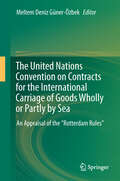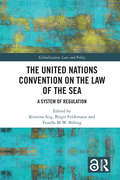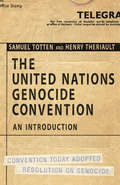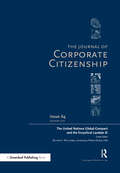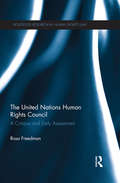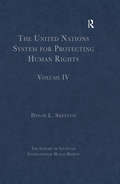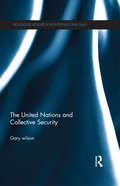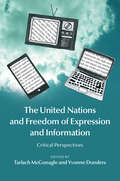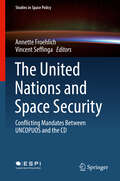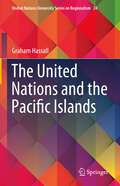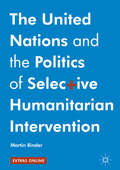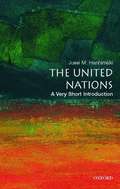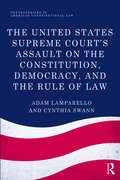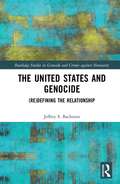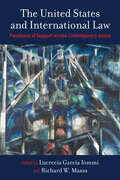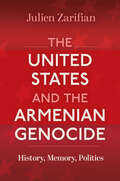- Table View
- List View
The United Nations Convention on Contracts for the International Carriage of Goods Wholly or Partly by Sea: An Appraisal of the "Rotterdam Rules"
by Meltem Deniz Güner-ÖzbekThe international carriage of goods by sea has been regulated by international conventions. These include the "International Convention for the Unification of Certain Rules of Law relating to Bills of Lading" ("Hague Rules"); the "Protocol to Amend the International Convention for the Unification of Certain Rules of Law Relating to Bills of Lading" ("Visby Rules"); and the "UN Convention on the Carriage of Goods by Sea." They were adopted in 1924, 1968 and 1978 respectively and the transport industry's commercial needs have since substantially changed. Furthermore the advent of subsequent regimes has resulted in the uniformity in the carriage of goods by sea once provided by the Hague Rules being lost. In order to update and modernize existing regimes the "UN Convention on Contracts for the International Carriage of Goods Wholly or Partly by Sea" ("Rotterdam Rules") was adopted on December 11, 2008 by the UN General Assembly and opened for signature on September 23, 2009. Since then drafters of the Rotterdam Rules, academics and practitioners have been publicizing, discussing, and evaluating the Rules. This book is an effort to further explore those same goals.
The United Nations Convention on the Law of the Sea: A System of Regulation (Globalization: Law and Policy)
by Kristina Siig Birgit Feldtmann Fenella M.W. BillingThe 1982 United Nations Convention on the Law of the Sea (UNCLOS) has for four decades been considered by many to be one of the most important legislative achievements of international law. It is revered as a "constitution of the oceans", providing the legal framework for the governance of the oceans. This volume explores how the UNCLOS is functioning in various complex settings, how it adapts to new, emerging developments, as well as how it interacts with other regulation, both within the law of the sea regime and outside. Engaging in themes such as law and order at sea, UNCLOS’ interaction with human rights and the role of private actors, the book raises complex questions in the application, understanding, and enforcement of the convention and how it can be envisaged, interpreted, and used in a dynamic world. The volume also raises methodological questions, the answers to which may enhance the predictability and coherence of the law under UNCLOS and thus secure its role as the predominant and relevant system for legal governance at sea for many decades to come. As a contribution to ensuring the future relevance of UNCLOS, the book will be a valuable resource for scholars, diplomats, judges and other practitioners who are working with and interpreting the law of the sea and related issues of maritime law, migration law, human rights law and humanitarian law.
The United Nations Convention on the Law of the Sea: A System of Regulation (Globalization: Law and Policy)
by Kristina Siig Birgit Feldtmann Fenella M.W. BillingThe 1982 United Nations Convention on the Law of the Sea (UNCLOS) has for four decades been considered by many to be one of the most important legislative achievements of international law. It is revered as a "constitution of the oceans", providing the legal framework for the governance of the oceans. This volume explores how the UNCLOS is functioning in various complex settings, how it adapts to new, emerging developments, as well as how it interacts with other regulation, both within the law of the sea regime and outside. Engaging in themes such as law and order at sea, UNCLOS’ interaction with human rights and the role of private actors, the book raises complex questions in the application, understanding, and enforcement of the convention and how it can be envisaged, interpreted, and used in a dynamic world. The volume also raises methodological questions, the answers to which may enhance the predictability and coherence of the law under UNCLOS and thus secure its role as the predominant and relevant system for legal governance at sea for many decades to come.As a contribution to ensuring the future relevance of UNCLOS, the book will be a valuable resource for scholars, diplomats, judges and other practitioners who are working with and interpreting the law of the sea and related issues of maritime law, migration law, human rights law and humanitarian law.
The United Nations Genocide Convention: An Introduction (G - Reference, Information And Interdisciplinary Subjects Ser.)
by Samuel Totten Henry C. TheriaultIt is virtually impossible to understand the phenomenon of genocide without a clear understanding of the complexities of the United Nations Convention on the Prevention and Punishment of the Crime of Genocide (UNCG). This brief but cogent book provides an introduction to the unique wording, legal terminology, and key components of the convention, which was adopted by the United Nations General Assembly in 1948. Providing clarity on the distinctions between genocide, crimes against humanity, war crimes, and ethnic cleansing, this book is designed to be an entry into further study of genocide in its legal, historical, political, and philosophical dimensions. Key terms, such as intent and motive, are explained, case studies are included, and a detailed bibliography at the conclusion of the book offers suggested avenues for more advanced study of the UNCG.
The United Nations Global Compact and the Encyclical Laudato Si: A special theme issue of The Journal of Corporate Citizenship (Issue 64)
by Oliver F. WilliamsIn April 2016, the Center for Ethics and Religious Values in Business of the Mendoza College of Business at the University of Notre Dame with the United Nations Global Compact (UNGC) Office convened a group of scholars and business leaders to discuss the Encyclical Laudato Si (LS) and the UN Sustainable Development Goals (SDGs). The articles in this special issue are from that conference; the hope is that they will provoke your thinking and lead to new action to make the world a better place.How is it that the secular United Nations and the religious Vatican have a common vision for business? At root, this common vision for business flows from a common vision for society as a whole.For business, flowing from this common vision is a common understanding of the purpose of business. Catholic social thought has always taught that the single-minded focus on making money in business can never be acceptable. The purpose of business is to create sustainable value for stakeholders and that value is not exclusively monetary value.
The United Nations Human Rights Council: A critique and early assessment (Routledge Research in Human Rights Law)
by Rosa FreedmanThe United Nations Human Rights Council was created in 2006 to replace the UN Commission on Human Rights. The Council’s mandate and founding principles demonstrate that one of the main aims, at its creation, was for the Council to overcome the Commission’s flaws. Despite the need to avoid repeating its predecessor's failings, the Council’s form, nature and many of its roles and functions are strikingly similar to those of the Commission. This book examines the creation and formative years of the United Nations Human Rights Council and assesses the extent to which the Council has fulfilled its mandate. International law and theories of international relations are used to examine the Council and its functions. Council sessions, procedures and mechanisms are analysed in-depth, with particular consideration given to whether the Council has become politicised to the same extent as the Commission. Whilst remaining aware of the key differences in their functions, Rosa Freedman compares the work of the Council to that of treaty-based human rights bodies. The author draws on observations from her attendance at Council proceedings in order to offer a unique account of how the body works in practice. The United Nations Human Rights Council will be of great interest to students and scholars of human rights law and international relations, as well as lawyers, NGOs and relevant government agencies.
The United Nations Programme on Crime Prevention and Criminal Justice
by Matti JoutsenThis book documents the evolution of the United Nations (UN) Crime Programme and its changing priorities, from the early focus on juvenile delinquency and correctional treatment, to the present preoccupation with transnational organized crime. It analyses what factors have contributed to this evolution, and to the shift from the original work on “soft law” resolutions and international standards, to “hard law” conventions, and to the expansion of technical assistance. It also examines the changing structure and working methods of the Programme, such as the UN Crime Commission and the UN Secretariat unit responsible for the Programme, the UN Crime Congresses, and the Programme Network Institutes. Drawing on almost 50 years of experience on the “inside” of the UN Crime Programme and his hands-on knowledge of the working of governmental and intergovernmental processes, Matti Joutsen explores the transitions that have taken place in the UN Crime Programme over the seven decades of its existence, assesses the changing impact of the Programme, and suggests possible future directions in international cooperation in crime prevention and criminal justice.An accessible and compelling read, this book will appeal to students and scholars of criminology, sociology, politics, criminal justice, policy makers, and those interested in the evolution of the UN Crime Programme.
The United Nations Secretariat and the Use of Force in a Unipolar World
by Ralph ZacklinThe end of the Cold War appeared to revitalise the Security Council and offered the prospect of restoring the United Nations to its central role in the maintenance of international peace and security. Between the Gulf War of 1990 and the 2003 invasion of Iraq, the UN Secretariat found itself in the midst of an unprecedented period of activity involving authorised and unauthorised actions leading to the use of force. Ralph Zacklin examines the tensions that developed between the Secretariat and member states, particularly the five permanent members of the Security Council, concerning the process and content of the Council's actions in the Gulf War, Bosnia, Kosovo and the Iraq War as the Secretariat strove to give effect to the fundamental principles of the Charter.
The United Nations System for Protecting Human Rights: Volume IV (The Library of Essays on International Human Rights)
by Dinah L. SheltonThe United Nations has been at the forefront of developing the international law of human rights for nearly seven decades. This volume brings together the leading research articles on the development of human rights law by the United Nations and also includes essays on issues relating to standard-setting, institutional evolution, and the creation of monitoring procedures.
The United Nations and Collective Security (Routledge Research in International Law)
by Gary WilsonThe role of the United Nations in collective security has been evolving since its inception in 1945. This book explores collective security as practiced within the legal framework provided by the United Nations Charter, with a particular focus upon activity undertaken under the auspices of the UN Security Council, the body conferred by the Charter with the primary responsibility for the maintenance of international peace and security. Although the book is primarily grounded in international law, where appropriate it also draws upon relevant political insights in order to present a clear picture of the UN collective security system in operation and the factors which impact upon the way in which it functions. Offering a comprehensive analysis it considers the full range of measures which can be utilised by the UN in the performance of its collective security remit including military enforcement action, peacekeeping, non-military sanctions and diplomacy. The book considers each of these measures in detail, assessing the legal framework applicable to the form of action, the main legal controversies which arise in respect of their appropriate utilisation, and the UN’s use of this collective security ‘tool’ in practice. The book draws conclusions about the main strengths and shortcomings of the various means through which the UN can attempt to prevent, minimise or end conflict.
The United Nations and Freedom of Expression and Information
by Mcgonagle, Tarlach and Donders, Yvonne Tarlach Mcgonagle Yvonne DondersThere are a multitude of UN legal instruments which pertain to the rights of freedom of expression and information, and this book is the first to comprehensively map them and their function. It details the chequered history of both rights within the UN system and evaluates the suitability of the system for overcoming contemporary challenges and threats to the rights. Leading scholars address key issues, such as how the rights to freedom of expression and information can come into conflict with other human rights and with public policy goals, such as counter-terrorism. The book's institutional focus comprises five international treaties, UNESCO and the UN Special Rapporteur on freedom of expression. Relevant for academics, lawyers, policy-makers and civil society actors, it also examines how new communication technologies have prompted fresh thinking about the substance and scope of the rights to freedom of expression and information.
The United Nations and Space Security: Conflicting Mandates between UNCOPUOS and the CD (Studies in Space Policy #21)
by Annette Froehlich Vincent SeffingaThis book provides a detailed analysis on the history and development of the Committee on the Peaceful Uses of Outer Space (UNCOPUOS) and the Conference on Disarmament (CD) and the coordination and cooperation between these two fora. Furthermore, it discusses the future challenges that these fora will have to deal with and conclude in which way the current system can change to cope with the evolution of space matters. This is necessary for the proper discussion of space matters because these matters cannot simply be divided between military and non-military, but are interrelated.
The United Nations and the Pacific Islands (United Nations University Series on Regionalism #24)
by Graham HassallThis book critically examines the relationship between the United Nations Organization and the small states of the Pacific islands. It provides an in-depth coverage of the United Nations, coupled with how Pacific Small Island Developing States interact. It covers three themes, the first one being the position of the UN on the Pacific Islands, which examines the role of the many UN organs, agencies and programs in strengthening individual countries and the region as a whole. It examines the manner in which the UN’s activities have benefited Pacific nations, territories and peoples. The second theme deals with the Pacific states in the UN, and examines the participation of Pacific nations and territories in the UN’s various organs, agencies, and programmes. It analyses the contribution they have made to the effectiveness of the organization, as distinct from the benefits they have sought to gain from it. The third and last theme deals with small states in global public policy, taking a broader look at how small states are faring within the UN system in the age of global discourse on shared public goods/public policy concerns.
The United Nations and the Politics of Selective Humanitarian Intervention
by Martin BinderThis book offers the first book-length explanation of the UN’s politics of selective humanitarian intervention. Over the past 20 years the United Nations has imposed economic sanctions, deployed peacekeeping operations, and even conducted or authorized military intervention in Somalia, Bosnia, or Libya. Yet no such measures were taken in other similar cases such as Colombia, Myanmar, Darfur—or more recently—Syria. What factors account for the UN’s selective response to humanitarian crises and what are the mechanism that drive—or block—UN intervention decisions? By combining fuzzy-set analysis of the UN’s response to more than 30 humanitarian crises with in depth-case study analysis of UN (in)action in Bosnia and Darfur, as well as in the most recent crises in Côte d’Ivoire, Libya and Syria, this volume seeks to answer these questions.
The United Nations, Peace and Security
by Ramesh ThakurEnding humanitarian atrocities has become as important for the United Nations as preventing interstate war. This book examines the transformation of UN operations, analysing its changing role and structure. Ramesh Thakur asks why, when and how force may be used, and argues that the growing gulf between legality and legitimacy is evidence of an eroded sense of international community. He considers the tension between the United States, with its capacity to use force and project power, and the United Nations, as the centre of the international law enforcement system. He asserts the central importance of the rule of law and a rules-based order focused on the United Nations as the foundation of a civilised system of international relations. This book will be of interest to students of the United Nations and international organisations in politics, law and international relations departments, as well as policymakers in governmental and non-governmental international organisations.
The United Nations: A Very Short Introduction
by Jussi M. HanhimäkiThe United Nations has been called everything from "the best hope of mankind" to "irrelevant" and "obsolete." With this much-needed introduction to the UN, Jussi Hanhimäki engages the current debate over the organizations effectiveness as he provides a clear understanding of how it was originally conceived, how it has come to its present form, and how it must confront new challenges in a rapidly changing world. After a brief history of the United Nations and its predecessor, the League of Nations, the author examines the UN's successes and failures as a guardian of international peace and security, as a promoter of human rights, as a protector of international law, and as an engineer of socio-economic development. Hanhimäki stresses that the UN's greatest problem has been the impossibly wide gap between its ambitions and capabilities. In the area of international security, for instance, the UN has to settle conflicts--be they between or within states--without offending the national sovereignty of its member states, and without being sidelined by strong countries, as happened in the 2003 intervention of Iraq. Hanhimäki also provides a clear accounting of the UN and its various arms and organizations (such as UNESCO and UNICEF), and he offers a critical overview of how effective it has been in the recent crises in Rwanda and the former Yugoslavia, for example--and how likely it is to meet its overall goals in the future. The United Nations, Hanhimäki concludes, is an indispensable organization that has made the world a better place. But it is also a deeply flawed institution, in need of constant reform.
The United States Constitution
by John R. VileWhat famous American refused to attend the Constitutional Convention because he smelt a rat? Why was a Bill of Rights omitted from the original Constitution? Can a president be sued for actions he takes in office? On what grounds may Congress punish its members? Where did the expression separate but equal originate? Do juvenile defendants have the same constitutional protection as adults? Is obscenity protected by the First Amendment freedoms of speech and press? What is the "Lemon" test? What is the only Constitutional Amendment that has been ratified by special state conventions rather than by state legislatures? These and many more provocative questions are answered in this easy-to-follow guide that makes learning about the Constitution fun for students. Written clearly, this guide addresses those topics of the Constitution students inquire most about, from its origins and background through the adoption of the 27th Amendment. The information in each chapter is organized in a logical progression to carry the reader along to a basic understanding of the provisions and is peppered with fascinating facts and intriguing legal interpretations of topics of interest to young adults. Ten chapters cover everything from the foundations and purposes of the Constitution to the 27th Amendment. The last chapter, A Walk Through American Constitutional History, uses the question-and-answer format to focus on key dates and events in American constitutional history. A selection of photos complements the text. Appendixes include the 100 questions and answers used by the Immigration and Naturalization Service for prospective citizens; lists of all Speakers of the House of Representatives, Presidents, and Supreme Court Justices from the beginning of the republic to the present; the date of admission to the union and the current number of congressional representatives of the 50 states; and the texts of the Constitution of the United States, the Declaration of Independence, and the Articles of Confederation. "
The United States Constitution (Documents That Shaped America)
by Therese SheaDescribes the events surrounding the drafting and ratification of the U.S. Constitution, and looks at how it provides structure for the nation's government.
The United States Constitution: What It Says, What It Means
by Justicelearning. Org StaffAffordable, readable, and indispensable,The United States Constitution: What it Says, What it Means allows you to put the most important document in American history in your back pocket. In conjunction with Justice Learning and The Annenberg Foundation Trust at Sunnylands and with an introduction written by Caroline Kennedy and an afterword written by David Eisenhower, this pocket guide appeals to the broadest possible audience. Each Article and each Amendment is followed by a clear and concise explanation, in plain English, that is suitable for both middle and high school students. On December 8, 2004 President Bush officially signed Constitution Day into law. The law mandates that each year, on September 17th, schools and colleges that receive federal money are required to teach the Constitution. The new law was championed in Congress by Sen. Robert Byrd who famously carries around a copy of the document in his pocket. Sen. Byrd became increasingly alarmed at the lack of civics education-specifically relating to the Constitution-in our public schools and he wanted to take action. Lightweight, easy to use and easy for everyone to understand The United States Constitution: What it Says, What it Means is an excellent way for students and citizens of all ages to read and completely comprehend the building block of American democracy. Justice Learning (www. justicelearning. org), is a comprehensive on-line resource that offers wide-ranging non-partisan materials relating to civics education.
The United States Department of Defense Law of War Manual: Commentary and Critique
by Michael A. NewtonThe United States Department of Defense Law of War Manual: Commentary and Critique provides an irreplaceable resource for any politician, international expert, or military practitioner who wishes to understand the approach taken by the American military in the complex range of modern conflicts. Readers will understand the strengths and weaknesses of US legal and policy pronouncements and the reasons behind the modern American way of war, whether US forces deploy alone or in coalitions. This book provides unprecedented and precise analysis of the US approach to the most pressing problems in modern wars, including controversies surrounding use of human shields, fighting in urban areas, the use of cyberwar and modern weaponry, expanding understanding of human rights, and the rise of ISIS. This group of authors, including academics and military practitioners, provides a wealth of expertise that demystifies overlapping threads of law and policy amidst the world's seemingly intractable conflicts.
The United States Supreme Court's Assault on the Constitution, Democracy, and the Rule of Law (Controversies in American Constitutional Law)
by Adam Lamparello Cynthia SwannThis book argues that the judiciary, particularly the Supreme Court, should embrace an interpretive framework that promotes equal participation in the democratic process, fosters accountability, and facilitates robust public discourse among citizens of all backgrounds. The authors propose a solution that strives to restore integrity to the Court’s decision-making process by eschewing ideology and a focus on the utility of outcomes in favor of an intellectually honest jurisprudence that gives all citizens a meaningful voice in governance. The work is divided into seven parts. Parts I–V identify the worst decisions in the Court history and the common themes that helped produce them. The chapters within each part are dedicated to a single Supreme Court decision, in which the authors analyze the Court’s reasoning and explain why it undermined federalism, separation of powers, and democratic governance. Additionally, the authors explain why these decisions compromised the relationship between the Court and coordinate branches, the federal government and the states, and citizens and their elected representatives. Part VI identifies several of the best Supreme Court decisions, and explains why they provide a principled framework that can be applied in other cases and result in a pro-democracy jurisprudence. Finally, in Part VII the authors propose a comprehensive solution that should inform the Justices’ judicial philosophies, regardless of ideology, and strive to promote an equal and participatory democracy. The final chapter offers concluding thoughts and argues that a healthy democracy is the foundation upon which equality rests, and that a collective view of rights is the path by which to restore liberty for all citizens.
The United States and Genocide: (Re)Defining the Relationship (Routledge Studies in Genocide and Crimes against Humanity)
by Jeffrey S. BachmanThere exists a dominant narrative that essentially defines the US’ relationship with genocide through what the US has failed to do to stop or prevent genocide, rather than through how its actions have contributed to the commission of genocide. This narrative acts to conceal the true nature of the US’ relationship with many of the governments that have committed genocide since the Holocaust, as well as the US’ own actions. In response, this book challenges the dominant narrative through a comprehensive analysis of the US’ relationship with genocide. The analysis is situated within the broader genocide studies literature, while emphasizing the role of state responsibility for the commission of genocide and the crime’s ancillary acts. The book addresses how a culture of impunity contributes to the resiliency of the dominant narrative in the face of considerable evidence that challenges it. Bachman’s narrative presents a far darker relationship between the US and genocide, one that has developed from the start of the Genocide Convention’s negotiations and has extended all the way to present day, as can be seen in the relationships the US maintains with potentially genocidal regimes, from Saudi Arabia to Myanmar. This book will be of interest to scholars, postgraduates, and students of genocide studies, US foreign policy, and human rights. A secondary readership may be found in those who study international law and international relations.
The United States and International Law: Paradoxes of Support across Contemporary Issues
by Lucrecia García Iommi Richard W MaassThe United States spearheaded the creation of many international organizations and treaties after World War II and maintains a strong record of compliance across several issue areas, yet it also refuses to ratify major international conventions like the UN Convention on the Law of the Sea and the Convention on the Elimination of All Forms of Discrimination Against Women. Why does the U.S. often seem to support international law in one way while neglecting or even violating it in another? The United States and International Law: Paradoxes of Support across Contemporary Issues analyzes the seemingly inconsistent U.S. relationship with international law by identifying five types of state support for international law: leadership, consent, internalization, compliance, and enforcement. Each follows different logics and entails unique costs and incentives. Accordingly, the fact that a state engages in one form of support does not presuppose that it will do so across the board. This volume examines how and why the U.S. has engaged in each form of support across twelve issue areas that are central to 20th- and 21st-century U.S. foreign policy: conquest, world courts, war, nuclear proliferation, trade, human rights, war crimes, torture, targeted killing, maritime law, the environment, and cybersecurity. In addition to offering rich substantive discussions of U.S. foreign policy, their findings reveal patterns across the U.S. relationship with international law that shed light on behavior that often seems paradoxical at best, hypocritical at worst. The results help us understand why the United States engages with international law as it does, the legacies of the Trump administration, and what we should expect from the United States under the Biden administration and beyond.
The United States and the Armenian Genocide: History, Memory, Politics (Genocide, Political Violence, Human Rights)
by Julien ZarifianDuring the first World War, over a million Armenians were killed as Ottoman Turks embarked on a bloody campaign of ethnic cleansing. Scholars have long described these massacres as genocide, one of Hitler’s prime inspirations for the Holocaust, yet the United States did not officially recognize the Armenian Genocide until 2021. This is the first book to examine how and why the United States refused to acknowledge the Armenian Genocide until the early 2020s. Although the American government expressed sympathy towards the plight of the Armenians in the 1910s and 1920s, historian Julien Zarifian explores how, from the 1960s, a set of geopolitical and institutional factors soon led the United States to adopt a policy of genocide non-recognition which it would cling to for over fifty years, through Republican and Democratic administrations alike. He describes the forces on each side of this issue: activists from the US Armenian diaspora and their allies, challenging Cold War statesmen worried about alienating NATO ally Turkey and dealing with a widespread American reluctance to directly confront the horrors of the past. Drawing from congressional records, rare newspapers, and interviews with lobbyists and decision-makers, he reveals how genocide recognition became such a complex, politically sensitive issue.
The United States and the Genocide Convention
by Lawrence J. LeblancIn this definitive study, Lawrence J. LeBlanc examines the nearly forty-year struggle over ratification of the Genocide Convention by the United States. LeBlanc's analysis of the history of the convention and the issues and problems surrounding its ratification sheds important light on the process of treaty ratification in the United States and on the role of American public opinion and political culture in international human rights legislation. Drawing on case studies of genocide committed since World War II, the author also confronts the strengths and weaknesses of international adjudication as a whole.Adopted by the United Nations General Assembly in 1948 in response to the atrocities committed by the Nazis before and during World War II, the Genocide Convention was finally made law by the United States Senate in 1988 contingent upon a series of "conditions"--known as the "Lugar-Helms-Hatch Sovereignty Package"--which, LeBlanc suggests, markedly weakened the convention. Through careful analysis of the bitter debates over ratification, LeBlanc demonstrates that much of the opposition to the convention sprang from fears that it would be used domestically as a tool by groups such as blacks and Native Americans who might hold the U.S. accountable for genocide in matters of race relations.
